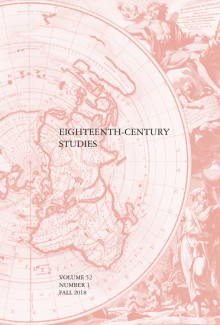
Johns Hopkins UniversityEst. 1876
America’s First Research University
Postcolonial Theory Is Alive and Well

In the first issue of the 2018-19 volume of Eighteenth Century Studies, Editor Sean Moore brought together a collection of papers focused on postcolonial theory and empire studies, a field which has been prematurely eulogized, according to Moore's introduction to the issue. The essays cover a wide range of subjects, including slavery and the Atlantic system, espionage and the American Revolution, and diplomatic exchanges of art between Europe and South Asia. Moore joined us for a Q&A on the issue, his use of analytics in the introduction and how scholars should approach a submission to the journal.
How important is it to occasionally put usage of the journal into context like you did in your introduction?
As far as I know, this issue contains the first discussion of usage of the journal. While it is important to understand this data for figures on royalities, its far greater purpose is to show us who the audience for the journal is and their tastes in articles. We were surprised to find that the top users of the journal were faculty and students outside the U.S. at U. Toronto, Cambridge, and Oxford, and also thought it interesting that the top two downloaded articles were about postcolonialism and empire, and that those articles were from many years ago. Investigating this data helped me to understand such articles as being in a “genre of analysis” rather than being specifically tied to a discipline; put another way, it is the theory and methodology of such essays that seem to draw such high readership, not the home department of their authors. I think that journal editors should write such an introduction yearly, apprising the readership of trends in reading and who their colleagues might be among the readership.

What is it like putting together an issue that bridged an editorial change?
Putting together an issue that bridged an editorial change was not that difficult, and I am grateful that the former editors Steven Pincus and Amy Dunagin left such a clear trail to follow. They had lined-up scholars to write for the roundtable section of the special issue, and we simply had to follow-up with those scholars. Also, they were not prescriptive in telling us which exact articles to list in the section, but rather cultivated a variety of eligible authors and submissions in the general area of postcolonial and empire studies, some of which eventually passed peer review and ended up printed in the special issue.
How satisfying is it to take essays from a variety of disciplines and wrap them around a single theme like empire?
It is very satisfying to do this, as it helps us to understand the common themes of our disciplines rather than our differences. It became clear to me that so many fields have been informed by postcolonial and empire studies, which returns me to the term “genre of analysis” being more important than the discipline it is coming from.
What is your advice to scholars considering a submission to Eighteenth-Century Studies (ECS)?
First, authors should be mindful that this is an interdisciplinary journal, so that if a submission comes in that is, say, a great close-reading of poetry by Alexander Pope, but contains no historical or philosophical contextualization complete with citations of recent historians or philosophers, we will not send it out for review. We send manuscripts to two peer reviewers from different disciplines represented in the essay, and have been know to send it to more if there are more if the author is working in more than two disciplines. Secondly, the author should articulate somewhere in the first three paragraphs of the essay the scholarly conversation he or she is in, complete not only with citations of the most recent scholarship, but how the essay is intervening into that scholarship. Otherwise we as editors and the peer reviewers themselves will not know the stakes of the essay – the “so what” question needs to be addressed early on. Third, authors should be sensitive to language, particularly if they are translating their work into English. We are an English-language journal, and though we like to see citations in their original language, those passages should be translated. A non-English language scholar should therefore run his or her translation by an expert in English translation.


